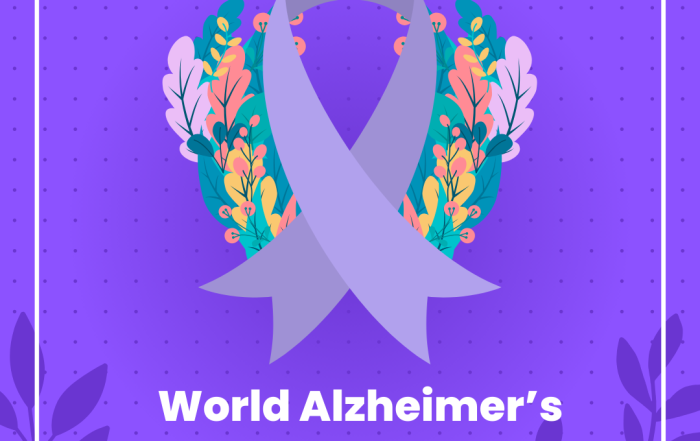World Alzheimer’s Month takes place every September and has been happening since 2012. The decision to introduce a full month around Alzheimer’s awareness and advocacy was made so that Alzheimer associations around the world would be able to extend their awareness programs beyond World Alzheimer’s Day. World Alzheimer’s Day is on September 21st. World Alzheimer’s Day marks the focal point of the Month and is the day that most global activity and awareness raising takes place.
Alzheimer’s disease is a degenerative disease that causes the loss of cognitive ability and memory. It is the leading cause of dementia. There can be some confusion between dementia and Alzheimer’s, but being aware of the difference between the two can help to understand the support that affected individuals may need.
Dementia refers to a general loss of cognitive functions, such as thinking, logic, memory and reasoning. It is a general term referring to the degeneration of brain function which may lead to additional symptoms such as emotional instability and changes in personality. Alzheimer’s refers to a specific brain disorder which causes dementia. Alzheimer’s is usually a late-onset illness which most commonly affects individuals in their mid-60s. Early-onset Alzheimer’s, usually presenting between a person’s 30s and 60s, is much rarer.
The following are some facts about Alzheimer’s that everyone should know:
- Prevalence: Alzheimer’s disease is the most common cause of dementia, accounting for 60–70% of all cases. It affects an estimated 6.5 million Americans aged 65 and over and could increase four times by 2050.
- Symptoms: Alzheimer’s is a progressive brain disorder impacting a person’s memory, thinking, and ability to carry out daily activities. Early symptoms may include forgetting recent events or conversations, difficulty with problem-solving, and confusion about time or place.
- Treatment: While there is no cure for Alzheimer’s, medications and interventions can help manage symptoms and improve a person’s quality of life. Medications include cholinesterase inhibitors and memantine.
- Risk Factors: Age is the main risk factor for Alzheimer’s. The risk doubles every 5 years after age 65. Other risk factors include genetics and head injuries. There may be a link between Alzheimer’s and certain medical conditions such as diabetes, high blood pressure, and obesity.
Statistics from the WHO
As we celebrate World Alzheimer’s month, we are going to take a weekly look at the disease and highlight these different topics: signs and symptoms, disease progression and affect on the individual and loved ones and finally a wrap up on the future of research and treatments.
Remember, on September 21, 2023, wear Purple for Alzheimer’s Awareness.
CBHomeCare and our Family of Providers are happy to assist you with assessing your family’s needs and helping to provide the care necessary to help keep your loved one at home where they want to be. Please feel free to call us at 800-700-0008, and we will be happy to answer all of your questions. You can also click here to read about our services.







